Planning to build an online platform for your business?
It’s an important step towards your business growth. Now, you will get listed among the 6 billion plus people that have their websites online. Amazing!
Your website acts as the heart of your business. Whenever it is working properly, your business will breathe without any suffocation but when it gets stuck somewhere your business would become breathless.
This being the fact, it is important to have a website because it displays your business’s objective to the whole world in terms of your products and services.
It’s a fact that whenever you hear the term “website”, it is WordPress that comes to your mind. This is because it is a popular CMS and there are around 75 million WordPress users today.
Do you know that you can develop a website even without using WordPress? Or in simple words, let’s say there are various WordPress alternatives that can help you create your website.
These tools and platforms available online will help you build your desired website, making them better alternatives to WordPress. In case you want to build a particular type of website, the tools listed in this article will match your preference and you can avoid the one-size-fit-for-all package that WordPress offers.
In this article, you will learn about the best WordPress alternatives that will help you create a website. You will also learn about different types of sites, platforms and tools that will help to create them.
Let’s start!
Reasons to Think Beyond WordPress
One of the most important things to know is that WordPress is a great platform.
You get high amount of flexibility and customization with WordPress as compared to the other most user-friendly website creation platforms. In addition, WordPress can be effectively used to create any feasible type of site. If it hadn’t functioned properly, it wouldn’t have been used to run more than 43.3 percent of all websites.
Two features that make WordPress a top contender while creating a new site are comprehensive functionality and enormous popularity. However, it isn’t necessarily the perfect option for every website. Even there are other alternatives to WordPress that might offer you all the features and functionalities required based on your site’s objective, scope and needs.
For instance, though WordPress today is used for developing websites too rather than just being a dedicated blogging platform, several of its functionality and interface is still built around blogs and content-focused sites. In fact you will be better served with a platform designed for e-commerce or single-page sites.
You can always use WordPress when you just want to create a quick, lightweight site, or one that doesn’t require updating frequently. This might be applicable when you simply want to get started fast instead of worrying about installing the required software and setting up wordpress hosting.
May it be any situation; you will get plenty of WordPress alternative platforms just at few clicks on Google. But, selecting a perfect one for your site can be bit tough. So, this article will make your search easier by sharing some of our favorite platforms as top alternative WordPress CMS.
Ideas to Create a Website (Instead of WordPress)
Further till the end of the post, you are going to see several types of websites and get introduced to some non-WordPress solutions you can use to create them. Note that we aren’t defining our views of whether the following tools are better or worse than WordPress but just mentioning the alternatives to WordPress. Each of the tool has its own unique features and intended uses.
Of course, this isn’t a complete list of options but just an overview of the most prominent choices in each category. By going through this list, you should be able to find a tool that matches your preferences.
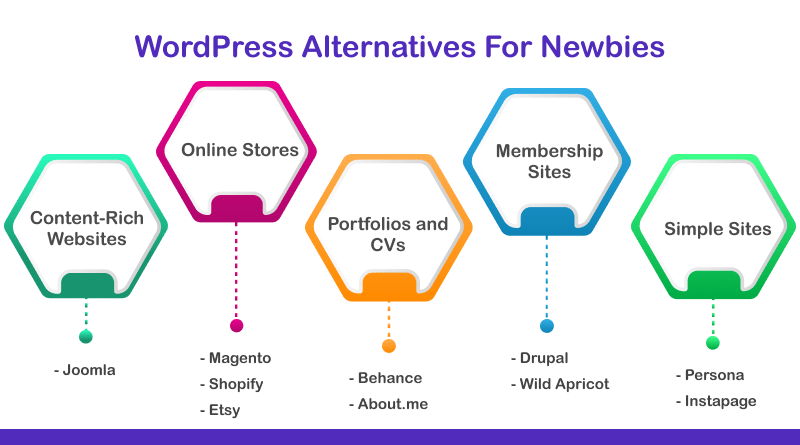
1. Content-Rich Websites
Joomla!
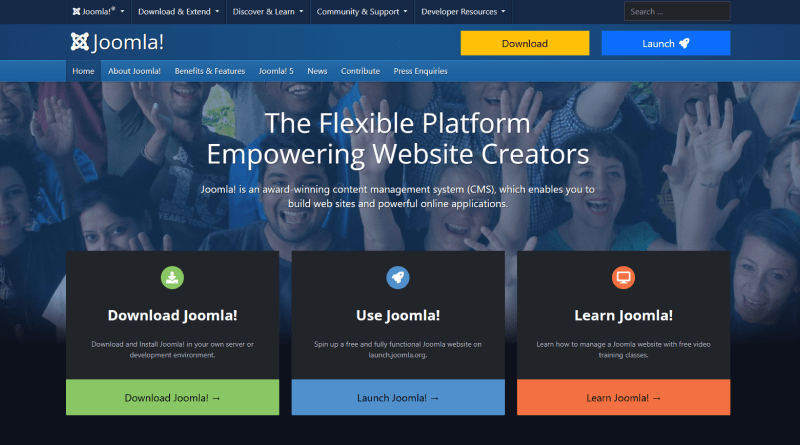
If you want a complete Content Management System (CMS) but think that WordPress doesn’t offer the complexity that you desire, then Joomla may be the best WordPress alternative for you.
Joomla functions similarly as WordPress but offers high scalability and flexibility. Therefore, Joomla! is an alternatives to WordPress and ideally suited for highly motivational projects, such as high-level traffic sites, sites with a large number of pages, or strong security and performance requirements. Additionally, you get more advanced configuration options for developers who want greater control over their site’s structure and functionality.
Joomla! is a free and open source platform and so, you can download and install it on your site in no time. Also, if your site is hosted at MilesWeb, it becomes easier as we offer Joomla! as a one-click install option.
2. Online Stores
Magento

Magento is a complete e-commerce solution that allows you to create your own online store but without the need of any additional software. It is a CMS that 100 percent focuses on e-commerce. Additionally, it enables you to create your own scalable and customizable storefront without any hassle.
Magento comprises of a built-in caching that improves page speed and offers limitless multi-site support. This means it allows you to run multiple stores from one place and also divide your store between different regions.
You can download the free Open-Source version of Magento to try it. Its Commerce edition can also be purchased, if you are planning to build enterprise sites and large businesses. Thus, we can say that, Magento is one of the great WordPress alternatives.
Shopify

It is very easy to start your online store with Shopify even for a newbie. It is the best choice when you want to create and customize a store on your own but don’t want to get bothered about the technical issues or getting your own hosting.
The main competitor of Shopify is WooCommerce and both have their own pros and cons.
Also, WooCommerce is a plugin that needs a WordPress site to function, and Shopify is completely independent, being the better alternative to WordPress.
You can start with Shopify by signing up for one of its plans.
Related: Shopify Vs Woocommerce Find The Best One For You
Etsy
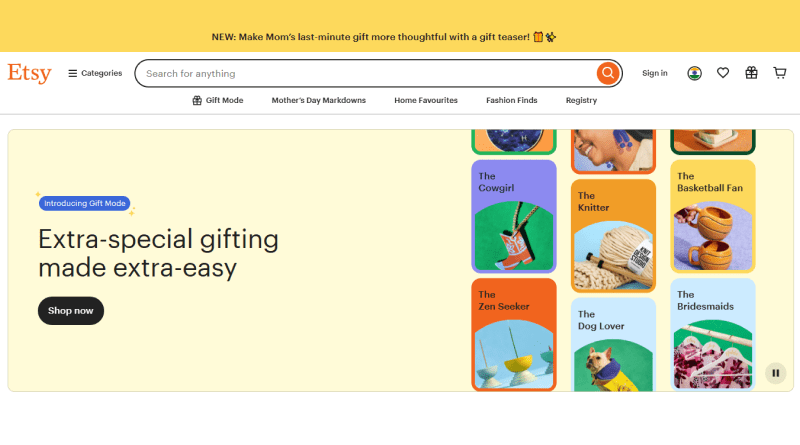
In case you aren’t planning to develop a large venture, you will find that some of the ecommerce solutions are quite intimidating. Thankfully, Etsy focuses basically on the individual products instead of offering a complete commercial framework.
It allows you to list products individually giving you complete control over the size of your e-commerce venture. For example, it is possible to sell single one-off items, such as antiques, or even create products to order.
It also offers simple payment method. You will need to pay some amount for listing while the additional transaction and payment processing fees need to be paid only when you make a sale. In simple terms, it means you need to pay the additional fees when you get started without any hurdles. Moreover, it is one of the best WordPress alternatives when it comes to working with minimum website configurations.
3. Portfolios and CVs
Behance

Behance offers you the combination of key requirements of a portfolio site along with the advantages of social media.
Basically, you can create a profile to display your work, which other users can see and comment on. Along with showcasing your creations you can also connect and search for new partners and collaborators.
It doesn’t offer you the options for customization in order to change the style of your gallery and page but the social features cover that gap. With Behance, it becomes easy to create an outlet that displays your products and helps you connect with others. Unlike the alternative to WordPress, you don’t have to add any social media plugins with Behance.
You can start with Behance by signing up for a free account. In case you have an Adobe account, you can also use that to create your profile.
About.me

Today, most internet users have spread information across multiple platforms and sites. With About.me you can create a simple page that collects your complete information and links to your different profiles in one place.
It is the best WordPress alternatives for freelancers, entrepreneurs, and creative designers, as it functions similar to an online business card. It enables you to style your page, add links and information, and also add a Call To Action (CTA).
You can create a page for free on this platform. In order to opt for additional features such as statistics and custom domains, you need to sign up for the Pro plan.
4. Membership Sites
Drupal
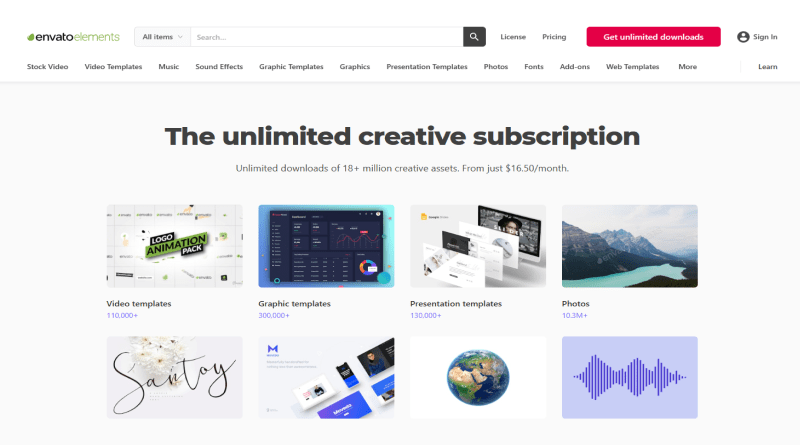
Drupal is also an open-source CMS with which you can create virtually any site that you imagine. However, its advanced and powerful nature makes it the highest sold platform as compared to its competitors. If you are planning to start a complex site with large amounts of traffic and complex structure, like the membership sites, Drupal is the best platform.
Drupal is highly flexible, and offers several options to developers for configuring each site as a WordPress alternative. You simply need to download and install the free Drupal software on your site. For building your membership site you can sign up for the Membership Entity module.
Wild Apricot
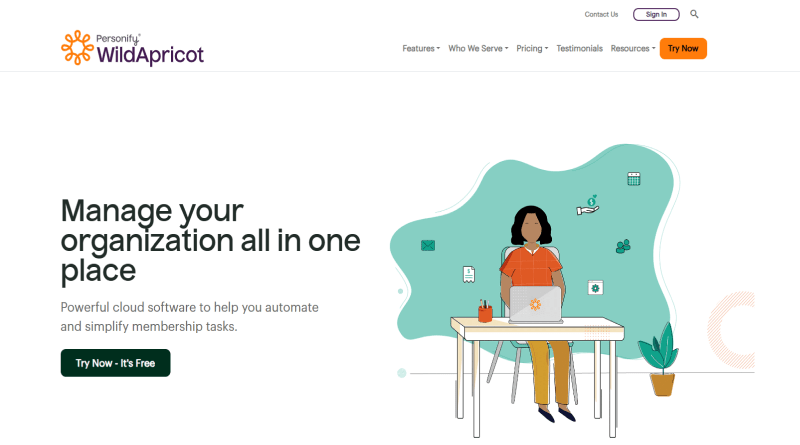
Wild Apricot is one of the WordPress alternatives that lets you create a membership site is Wild Apricot. You get the features that allow you to create profile pages, member sign-up forms, event registration pages, calendars and so on.
You can also create a website from scratch using Wild Apricot and then integrate it into WordPress. Isn’t that amazing? With this, you get more out of its features along with the benefits offered by WordPress.
Wild Apricot offers a 30 days free trial. After trying it for a month you can opt for its premium plans.
5. Simple Sites
Persona

Want to promote your product, service or event or just want to create a striking design? It is possible with a single-page as Persona makes that single page to appear unique.
It offers variety of templates and each of them appears to be more visually impressive than the other. You just need to select the template and then add your own content. You can create many types of pages with this very simple yet best WordPress alternative tool.
You can create a site for free with Persona but you can’t make it live unless you purchase an upgrade.
Instapage

You might need to create a landing page or market a product, business, or service. This is where Instapage comes into spotlight. In includes a drag-and-drop page builder with which you can easily create personalized landing pages.
Instapage also allows multiple team members to collaborate on a page which is its significant aspect. Due to this, the users can review and edit the page together and also add comments for each other. Plus, you can do A/B testing and pixel tracking to track your site’s performance. In addition to that, it offers a free trial for 14 days, classifying itself as a free WordPress alternative.
Checked the Platform Options – What’s Next?
No doubt WordPress is a best choice for almost any website. It currently powers nearly a third of all websites and surely there’s a reason behind this. But sometimes you won’t find it as a right option for every occasion or maybe you would need a more dedicated solution for your site. In fact, the above-mentioned alternatives to WordPress may complete your requirements in a much better way.
In this article, you have learnt about different website types, such as blogs, e-commerce stores, and membership sites and also, the solutions for creating those types of websites. The platform you select will always depend on your requirements, preferences, and level of expertise. But, you will surely find a solution listed here that fits your needs.
FAQs:
Which platform is better than WordPress?
To mention a better alternative to WordPress, you need to analyze what your website’s requirements are. Whether you want a website to specify single products or create a whole e-commerce-oriented website, our blog mentions the best WordPress alternatives.
Which platform is used to design websites except WordPress?
Apart from WordPress, many WordPress alternatives come with drag-and-drop website design tools. For instance, Instapage, Drupal, Etsy, and others are all suitable platforms for designing websites.
Is there a cheaper alternative to WordPress?
Of course. Many WordPress alternatives offer free trials and free versions that can be cheaper alternatives to WordPress.
What is more advanced than WordPress?
For advanced users, Drupal, Magento, Joomla, and others offer more control and customization than WordPress. So if you have extensive technical expertise, go with these best WordPress alternatives.
Should I learn HTML or WordPress?
HTML and WordPress both offer advantages in their respective areas. Hence, it is wise to learn both HTML and WordPress. However, if you are just interested in the building blocks of webpages, then HTML is the go-to option, while learning WordPress will help you manage content easily.








